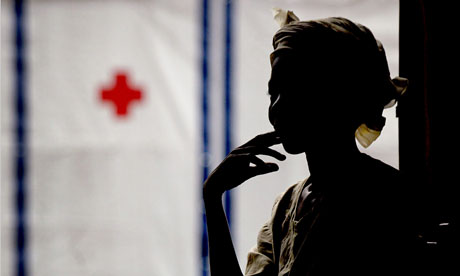

At an event in the Foreign and Commonwealth Office last night, the foreign secretary will launch a high-profile new initiative on tackling sexual violence in conflict.
It's an issue that deserves a high profile. In Rwanda, at least 250,000 women were raped during the 1994 genocide. Up to 50,000 women were raped in the war in Croatia and Bosnia-Herzegovina between 1992 and 1995, and in Sierra Leone it is estimated up to 64,000 women were raped between 1991 and 2002. We will never know the scale of rape during earlier conflicts, but we know the problem isn't new.
It is good that the UK government is taking a stand. Without a doubt, it raises it up the political agenda at home and abroad, cementing the UK's position as a leader on women, peace and security issues. The emphasis on tackling impunity is an important step in the move away from seeing sexual violence as the unavoidable "spoils of war" to a crime that is punishable and will not be tolerated. But looking at the Foreign and Commonwealth Office's proposals, a vital link in the chain seems to be missing. Where are women's rights?
The foreign secretary's plan to deploy teams of experts in conflict zones may make an important contribution to tackling impunity and reducing sexual violence, but only if women's rights are at the centre of their mandate and their response is rooted in the realities and immediate needs of survivors. The Gender Action for Peace and Security Network has produced an early response to these proposals.
The expert teams will include doctors, psychologists, police, lawyers and forensic experts. But they should also include experts in gender equality and violence against women. Gender expertise must be recognised as such. The UK would not discuss transition of troops without military and diplomatic experts in transition, so why would they deploy teams to work on tackling sexual violence, which is rooted in structural inequalities and the oppression of women, without experts in women's rights? The government would do well to learn from the approaches of UK experts on violence against women, particularly in ensuring safe spaces for reporting violence and support for accessing appropriate services.
The Foreign and Commonwealth Office is right to include proposals for increased and improved evidence collection, which would strengthen the international community's understanding and response to the epidemic levels of devastating violence. However, the starting point for evidence collection must be with the needs of survivors. After sexual violence, women need access to healthcare, psychological support to tackle trauma, and access to robust legal systems, where police and justice officials are trained to deal with survivors of rape and sexual violence in a sensitive manner. Access to basic services will support women to report, and this must be the priority.
Women's rights organisations are the link in the chain that will ensure sustainable change which addresses the root causes of violence. Any intervention by the UK government should build on and support the work of these organisations, rather than duplicating or superseding them. Before any deployment, existing efforts should be mapped in collaboration with women's rights organisations. Yet women's rights organisations are constantly underfunded and struggle to be heard.
Finally, women's participation in all levels of government and decision-making is a key tool to tackling violence against women. Michelle Bachelet, director of UN Women, has asserted that countries with more women in parliament tend to have more equitable laws and social programmes and budgets that benefit women and children and families. Yet globally, less than 20% of parliaments are made up of women. In the last 25 years, only one in 40 signatories to peace agreements have been women. How can societies rebuild and deal with the legacy of sexual violence when the voices of those most affected are marginalised or silenced? Women's leadership – at community, regional and national level – is a key ingredient of a safer world, where women can live in freedom from fear of violence.
